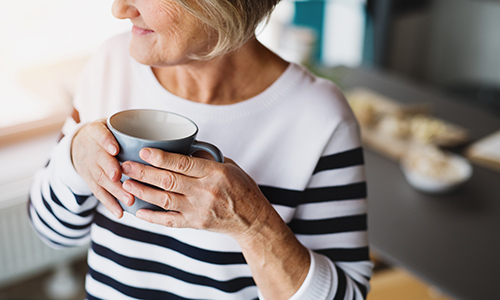Living with chronic pain | The link between chronic pain and mental health
- Overview
Thankfully, you can take charge of your pain with small actions that can make a big difference. Making everyday changes to your mental and physical routine can go a long way to adjusting your perception and understanding of chronic pain.
What is the relationship between chronic pain and our mental health?
Everyday tasks can feel like daunting challenges if you have a chronic condition that causes chronic or long-term pain. Depression and anxiety can quickly set in due to limited ability to exercise, remain active and live independently. This can lead to a leading to a downward health cycle. But chronic pain doesn’t have to mean living a limited life.
What conditions can cause chronic pain?
- Arthritis
- Cancer
- Fibromyalgia
- Chronic fatigue syndrome
- Chronic back pain
- Neck pain
- Diabetes
- Neurogenic pain
Understanding balance

It’s tempting to charge into an activity and get things done when you’re feeling good. When we’re happy and having a good pain day, scheduling in more activity can lead to a crash further down the line.
Unfortunately, this energy boom can end in a bust, leaving you feeling too sore to do anything the day after. One approach is to plan the tasks that you need to do a week in advance and work through them one at a time, day by day.
Another top tip is to inform your friends and family about how you’re feeling. If you can communicate when you’re feeling at your best, you’ll be less likely to go overboard in the company of others.
How to relax with chronic pain
Don’t forget to schedule in some time to relax. Relaxing is a great way to recharge our bodies and our minds. Whatever you do to relax – from soaking in a hot bath to listening to soothing music, ensure you make time for it every day.
If you’re looking for some different ways to unwind, have a look at some of our favourites below:
- Yoga: yoga is a holistic practice that originated in ancient India. The practice offers a multifaceted approach to managing chronic pain by addressing both the physical and psychological aspects of the condition
- Meditation: while mindfulness will not directly eliminate the physical source of pain, it can help individuals cope with their pain more effectively and improve overall day-to-day wellbeing
- Focus on your breathing: when we concentrate on our breathing, we allow thoughts to come and go as they choose without interference. Focus on a deep inhale and holding it at the top before you release
- Get in touch with your senses: take time to appreciate what you can immediately see, smell, feel and taste. This can help take your mind off your pain by transferring focus onto what you can see, feel, hear, taste and smell
- Body scan meditation: this is best performed at home when lying down on your bed or sofa. Start at the top of your body and focus your attention deliberately on your feet. When you’re done, move on to your ankles, continuing until you reach your head. This exercise can also help with falling asleep at night.
Free Nuffield Health Joint Pain Programme
We’ve helped thousands of people up and down the country understand, treat and independently manage chronic joint pain with our free to join Joint Pain Programme.
The 6-month programme teaches about joint pain and pairs you up with a professional pain management specialist to give you insight into your condition, along with tips and tricks to manage it moving forward.
The best thing about the programme is that it works. If you’re interested in moving forward and managing your chronic pain with knowledge and exercise, click here to learn more.
Exercises for chronic pain relief
Don’t be fooled into thinking you can’t exercise if you’re living with pain. In fact, exercise can be one of the most effective management techniques for chronic pain.
Cardiovascular exercise increases blood flow, improving your immunity and reducing inflammation. Whether you're dealing with chronic back pain, hip pain, shoulder pain or another joint problem, consider adopting a strength training programme. Getting stronger can help build muscle to support your joints, reducing the chance of injury and reducing pain in the long term.
Need more rest and recovery? Click here to learn more
Which workouts are best?
Whilst it’s hard to say which workouts suit an individuals unique circumstances, we’ve put together a list below that can help individuals with chronic pain build muscle and strengthen their joints over time:
- Back workout for strength and stability
- Exercises to help strengthen your joints
- Improve your upper body strength
- 5-minute full body pump workout with Zahra
The value of endorphins
Exercise has a great effect on the mind too, by releasing chemicals called endorphins into the body. These “feel good” chemicals are picked up by receptors in our brains and are responsible for that happy feeling so many of us love after exercise.
Coupled with a sense of achievement from a good workout, endorphin release will lift your spirits and encourage the adoption of a regular exercise regime.
How mindfulness can help with chronic pain

Living with daily pain can cloud our ability to enjoy life.
Mindfulness is a technique that uses the senses to focus on the small things around you. It can help you get a better perspective on your own pain and appreciate the little pleasures in life.
Try breathing deeply and isolating all that you can smell around you. Listen to your surroundings and try to pick out separate sounds. These small changes in concentration can provide temporary relief and take you out of yourself.
When to see a professional
A professional physiotherapist will assess your condition and provide a tailored set of movements and exercises to help improve your condition. If you suffer with chronic pain, regular visits to a physio can help determine whether or not your posture and habits are contributing to your pain level.
If you are concerned about your chronic pain or you notice an increase in your pain level without causation, consider booking an appointment with a GP to get checked out.
Last updated Thursday 17 August 2023
First published on Tuesday 2 October 2018
